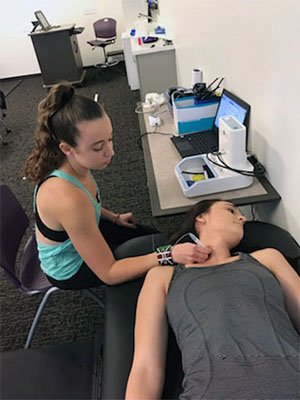
By Lana Sweeten-Shults
GCU News Bureau
“Take two pills, do 30 minutes of high-intensity interval training three times a week and call me in the morning.”
It’s not the typical prescription, but it very well might be the kind that soon will be given to Grand Canyon University students, faculty and employees who visit the Canyon Health and Wellness Clinic, thanks to a new program spearheaded by the Student Wellness and Health Association.
The association succeeded in landing the University a designation as an Exercise is Medicine campus. The global health initiative is managed by the American College of Sports Medicine.
“That whole initiative is to try to get the medical personnel to work better with the fitness industry. So they’re trying to push and educate the clinical population to prescribe, just like you go to the doctor and get a drug that they prescribe to you specifically, well, now it’s given to prescribe exercise, whether that’s resistance training or aerobic training or something like that,” said exercise physiologist and College of Science, Engineering and Technology faculty Dr. Zachary Zeigler, GCU’s Exercise is Medicine on Campus faculty adviser.
Zeigler said college students don’t always have the healthiest habits: “We know that college students are notoriously very unhealthy. We know about the freshman 15. They gain weight. They’re away from home and mom and dad, so they’re eating garbage and not exercising. They’re studying too much. So they wanted to push this initiative on campuses.”

GCU was able to receive the Exercise is Medicine on Campus gold-level recognition – the highest level -- which required the applicant school to set up a referral system with the campus clinics.
What this program means for the GCU community is that when a student, staff or faculty member visits the health clinic and health personnel are gathering initial new patient information – name, date of birth, health history and the like – they also are going to ask about exercise.
The initiative encourages colleges and universities not just to prescribe exercise but to promote physical activity for better health by making movement a part of the daily campus culture, assessing physical activity at every student health visit, and providing tools to strengthen healthy physical-activity habits.
“Anybody that goes into the student health clinic, whether it’s a student or faculty, as part of their normal health history, now we’re going to ask them questions about exercise,” Zeigler said. “So say you go in there to the normal doctors and they say, ‘Hey, do you exercise?’ You say, ‘No.’ ‘OK, you should go to the HIP Clinic.’”
The Health Information and Programming Clinic was started by the Student Wellness and Health Association and is run by the group.
Students at the HIP Clinic – they’re part of the GCU’s exercise science program -- will oversee a series of exercise tests, which aren't the standard how-many-pushups-can-you-do kind of test, Zeigler said, adding, “You come in – it’s all free – and we assess a lot of these measurements you wouldn’t get routinely. So we do basic blood pressure. We get your body fat for you. We get that kind of stuff. But then we measure the pressure of your aorta -- that’s not something that we normally get. We know that the blood pressure in your aorta is way more important than the blood pressure in your arm. So we measure that, but we also measure how stiff your arteries are through a procedure that we do in the clinic – again, that’s something you don’t routinely get.”
Zeigler said another test the HIP team will conduct is a VO2 max test, or maximal oxygen consumption test. It refers to the maximum amount of oxygen a patient can use during intense exercise. It is considered the best indicator of cardiovascular fitness and aerobic endurance.
“We get you on an exercise bike, and we push you as hard as we can get you to go," he said. "There’s a lot of numbers we can get from that test that will help us give you an exercise program but also can give you an understanding of your overall health.”
Patients typically have access to only some of these tests at a cardiologist’s office; now they'll be able to tap into that kind of high-level fitness knowledge right here on campus.
Besides the fitness assessment, the HIP Clinic also follows the FITT Principle, which stands for frequency of exercise, intensity, time and type in prescribing an exercise program. A FITT program recommendation might be to include medium-intensity endurance exercises three days a week for 30 minutes at a time.

To keep the Exercise is Medicine on Campus gold-standard designation in place, Zeigler said that more than a referral process must be set up. A certain number of faculty also have to be program advisers, a certain number of students must be designated student representatives of the program, and the campus must offer a number of free general nutrition and exercise advice classes.
“As long as it’s advice that we can give to a group of, say, incoming freshmen about basic things, like here’s how you can eat healthy as a college student or maybe even the benefit of exercising even during finals for stress relief, cognitive performance and things like that,” he said.
One thing he wanted to emphasize is that, for this program, “it’s 100 percent students doing everything – that’s the big thing. It’s a referral system from the health clinic that goes to a student who is in charge of it, a student schedules them … they do these assessments.”
Zeigler said the Exercise is Medicine on Campus designation is so new, it hasn’t been incorporated into the clinics yet. There’s still some training to be done, but he hopes to push out the program in February.
Contact senior writer Lana Sweeten-Shults at [email protected]. Follow her on Twitter @LanaSweetenShul.



































































